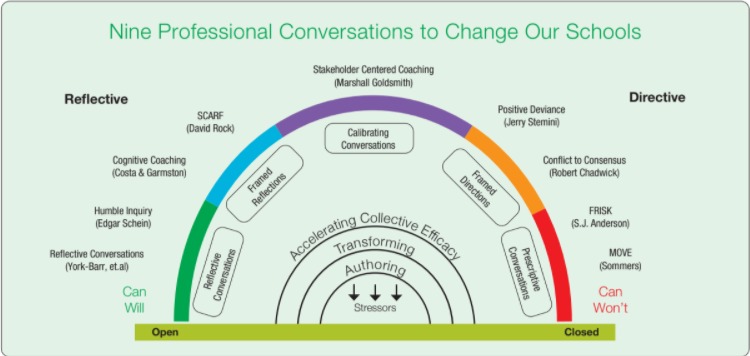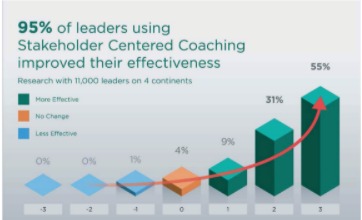Elevate AND Evaluate
As educational leaders, at all levels, evaluating people and their talents is an ongoing responsibility. Leaders will want to have multiple strategies in their skillset. As the graphic below shows, a dashboard of options and the agility to use that dashboard can provide competence and confidence for leaders.
Diane Zimmerman and Bill Sommers used this graphic in their recent 2019 book, 9 Professional Conversations to Change Schools: A Dashboard of Options. One of the overarching goals is to increase collective efficacy. Notice the left side, which goes from green to blue, is
dedicated to more reflective conversations. About a third of the people that leaders work with possess the ability to reflect on their knowledge, skills and application. This results in making necessary adjustments and getting better.
The middle of the dashboard, which ranges from blue to orange, identifies areas where data, feedback and information will be required to demonstrate areas for improvement. Remember, data is only data. Humans bring meaning and understanding to the data.
On the right side, which ranges from orange to red, are conversations that are not easy, yet very necessary. Wil Felps, et.al., has found that one negative person can reduce productivity by up to forty percent. When conflict exists, leaders must leverage it, manage it or end it.
Educators know that when dealing with a disruptive student, they try to modify or correct the behaviour prior to consequences. Moving directly to consequences does not give the student the option to change and, more importantly, the rest of the class may interpret the correction as mean, unfeeling or just plain punitive. When given an opportunity to change, it is the choice that is seen as fair. Of course,
when dealing with harmful behaviour for the student or class, immediate action is required. 
The same is true for the professionals in the school or business. In any hearing for disciplinary action, the question will be asked, “What did you do to correct the behaviour?” Without a plan of correction and giving options to be better, the decision probably will not be in the leader’s favor. That is why having multiple options available is so important.
Let’s focus on the top of the arch of Stakeholder Centered Coaching. This process, developed by Marshall Goldsmith, got my professional attention with his book, What Got You Here Won’t Get You There. How many leaders believe that what you have in knowledge and skills are going to be enough for the future? How many of you were ready for COVID?

True, some of the effective skills already in your skillset will be valuable as we navigate the future AND the VUCA environment will require continued learning for everyone.
(See https://learningomnivores.com/rules/new-rule-choose-vuca/ for additional explanation.)
Stakeholder Centered Coaching (SCC) has been used successfully in business for years. Bill has been using this process for the past four years in education with similar results and has seen a ninety-five percent improvement. Central office leaders want that for building leaders. Board
of education members want this for central office and superintendents.
A short description of the process follows:
• Get feedback from direct reports the leader trusts.
• Choose one or two goals to improve upon.
• Make those goals public.
• Get feedback from stakeholders as the coaching process continues.
• Get a final assessment from stakeholders at the end of the coaching.
One supervisor recently said, “I want to know what you are doing on these Friday calls. He seems happier on Friday.” This is not easy AND is important work for leadership improvement.
Those who choose to enroll in this process will require a commitment to three things that have proven to be critical in successful coaching engagement.
1. Courage – the commitment to hear and see information honestly. I call it a ruthless assessment of reality.
2. Humility – the commitment to listen and learn. When I have tried to improve my leadership skills, I had to admit that I didn’t know something, or I wasn’t as good as I wanted to be.
3. Discipline – the commitment to follow through on agreements. If there is no follow-through, how will you ever know if the idea or process will be effective?
Elevating leadership skills will be needed everywhere. Several articles have identified an increase in people leaving teaching and administration. This will require highly-skilled leaders to:
• create AND hold the vision of learning. Consider the African Proverb: Not Learning is Bad, Not Wanting to Learn is Worse.
• help staff develop more repertoire for more students AND the agility to use what is needed for diverse learners. Those with the most flexibility have the most influence.
• communicate to the community what schools can do AND how to collaborate in supporting young people for a life after high school. Internal and external communication is critical.
• attract AND retain our best certified and non-certified staff. Create talent density with the staff and budget you have.
• Continue to be a learner. As the French Proverb says:
Children Need Models More Than Critics. Welcome to the challenges ahead, which are not for the faint of heart. To quote Angeles Arrien, “If your job is waking up the dead, GET UP! TODAY IS A WORKDAY.”
